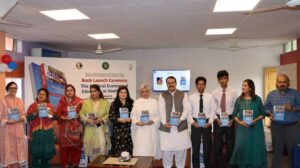PROMISED a good life, to be ‘treated as family’, and given wholesome meals, decent wages and access to education, the reality for many millions of domestic child workers in Pakistan is just the opposite.
Domestic servitude puts children’s well-being at risk. They are made to work from sunrise to sunset, fed leftovers, allowed little rest and are locked up and brutally beaten.
Earlier in May, eight-year-old Zohra Shah’s employers allegedly beat her up so badly that she died of her injuries for releasing the household’s prized parrots from a cage. In 2019, a 16-year-old domestic worker Uzma Bibi was brutally tortured and murdered for helping herself to a small piece of meat. In 2018, 10-year old Tayyaba’s bruised face was all over social media.
While not all child domestic workers are treated as severely, the ILO considers domestic work hazardous. It exposes children to violence, abuse, sexual abuse and long hours of work while denying them access to healthcare and education.
Domestic labour puts the child’s well-being at risk.
It is illegal to employ children under 18 in factories and other service industries, but except for Punjab there is no law banning them from working inside homes. And thus this shroud of invisibility provides the perfect impunity to employers to perpetrate violence till the time a case like Zohra Shah’s surfaces.
Then the entire country goes into some kind of collective retribution. Social media highlights abuse by employers, hashtags call for justice for the victim or survivor; the police get into action and arrest the alleged perpetrators; mainstream electronic media flash ‘breaking news’; newspapers publish editorials; and Pakistani legislators, celebrities and influencers send messages with sentiments ranging from shock and anger to anguish. Often this outrage subsides as quickly as it erupts. Zohra Shah was forgotten even before she was quietly buried in her village of Muzaffargarh. Few seem interested in following up on the pressure the parents of such children often face from employers to quash the case or keep quiet in exchange for ‘hush’ money.
However, things seem to be looking up this time around. While the adults have been dilly-dallying for years over this issue, this time the youth of Pakistan have taken it upon themselves to end the scourge.
The campaign to end child domestic labour, initiated by Idare-e-Taleem-o-Aagahi (ITA) last month may have found traction with 20 rights-based Pakistani organisations, but it is the youth who seem to be this campaign’s backbone. Aged between 10 to 18 and belonging to all strata and school systems from across the country, they have stepped in to end what is so normalised in Pakistani society and which one young student terms as nothing but ‘child abuse’.
But along with bringing about a mindset change, it is time to look at how the country’s law is protecting its children.
For instance, there is some confusion in the statute book that needs to be cleared. Section 328-A of the Pakistan Penal Code gives the child ample protection, Section 89 of the same PPC allows parents, guardians and teachers to use corporal punishment in “good faith”.
While good laws need stricter implementation, certain existing ones need amendments. According to Minister for Human Rights Shireen Mazari, the 1991 Employment of Children Act needs to be amended to include child domestic labour among the list of proscribed jobs considered hazardous and banned for children under 14.
The ITA wants to make it even more watertight by proposing a constitutional amendment in Article 11(3) prohibiting all children under 16 from engaging in any form of labour, in any capacity. Those between the ages of 16 and 18 may work, but only in non-hazardous occupations, with well-defined codes of working conditions, and hours and wages stipulated in a written contract.
But even before all the tweaking of law is carried out, the contradictions within the country’s Constitution and the Penal Code about the legal age of a child needs to be addressed. Article 25A of the Constitution that makes the state responsible to provide free and compulsory education terms a child to be anywhere between the ages of five to 16 years; Article 11 disallows slavery, forced labour, human trafficking and hazardous employment for children under the age of 14.
Presently, the only province that prohibits child domestic labour is Punjab with its Punjab Domestic Workers Act, 2019. But campaigners say it is weak in addressing child domestic labour as it only prohibits children under 15 from being employed and the violators get away as neither punishment nor fine are tough enough. Further, the violators cannot be arrested by police. It is time other provinces followed suit while the legal loopholes that exist in the Punjab law must be closed.
While laws will be crafted, in the end it is society itself that can end this practice by disabusing itself of the notion that it is doing poor families a good turn by hiring their children.
The writer is a freelance journalist based in Karachi.
Published in Dawn, July 29th, 2020
Source: Dawn News




